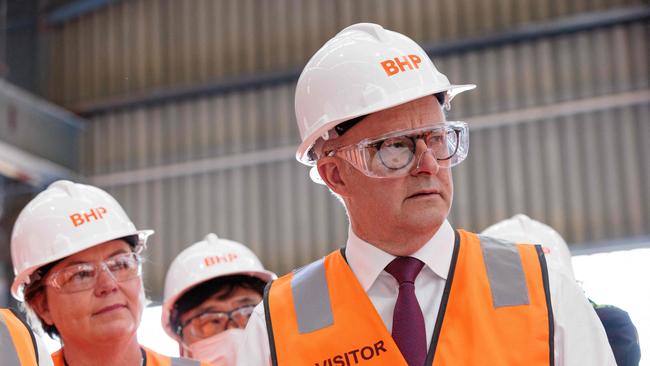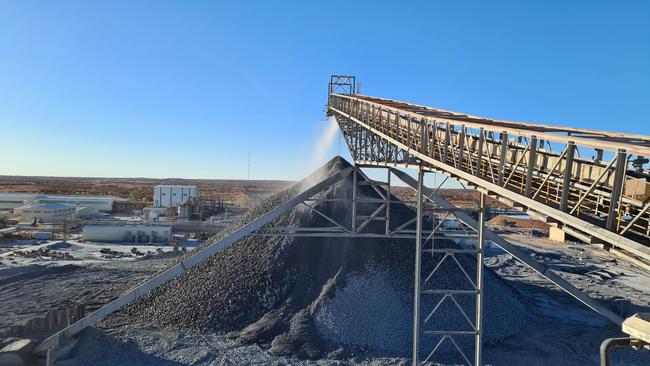Lifelines fail to keep BHP nickel mines afloat
The Albanese government’s efforts to avert the closure of BHP’s West Australian nickel operations have failed, with the ongoing weakness in nickel price set to cost thousands of jobs.

The Albanese government’s efforts to avert the closure of BHP’s West Australian nickel operations have failed, with the ongoing weakness in nickel price set to cost thousands of jobs and deliver a major blow to Australia’s critical mineral ambitions.
BHP on Thursday confirmed it would start shuttering its nickel mines and processing facilities from October, putting about 3000 jobs in the company’s Nickel West division in doubt.
Confirmation of the suspension came less than five months after Labor responded to BHP’s warnings about Nickel West by placing nickel on its critical minerals list, opening the door to nickel companies to access financing under the government’s $4bn critical minerals facility.
BHP, however, never accessed any of that funding.
In the May budget, Treasurer Jim Chalmers also announced a production tax incentive for critical minerals producers aimed at encouraging investment in new manufacturing plants.
WA’s Cook Labor government had also offered a 50 per cent rebate on nickel royalties in an effort to try to keep the state’s nickel operations afloat.
The suspension of Nickel West is likely to have broader impacts on other nickel producers and Australia’s hopes of becoming a more meaningful player in the downstream processing of materials for the renewables and batteries sector.
Other third-party nickel miners who had their ore processed through BHP’s Kambalda nickel smelter will now have to transport their material to facilities overseas, adding to their costs at a time when most in the industry are struggling for profitability.
Federal Resources Minister Madeline King said that while the government had tried to support the nickel industry, the scale of the commercial difficulties facing Nickel West due to global nickel markets was too great.
She said the suspension would have a substantial impact on the workers and communities of Kwinana, Kambalda and Kalgoorlie. “The decision is disappointing,” she said. “It’s a hard day for workers and WA, and it reflects the extreme volatility in global nickel markets.”

WA Premier Roger Cook said his thoughts were with the thousands of workers and their families affected by the news: “This announcement again shows the volatility of global commodity markets and reinforces the importance of my government’s work to diversify our economy and build more resilience into our resources sector.
“We’re investing billions to set up our economy for the long term, helping to smooth the volatility in our mining sector and create long-term local jobs for WA.”
BHP’s Nickel West business, however, had been part of the efforts to bring more diversity to WA’s mining-heavy economy.
The company had in recent years invested in the construction of a new nickel sulfate plant capable of producing material sought after by electric vehicle battery manufacturers, buoying politicians to believe Australia could have a role in critical minerals beyond the supply of raw materials.
The suspension of BHP’s nickel will include BHP’s Kwinana nickel refinery, which sits in the electorates of both Ms King and Mr Cook.
WA Liberal leader Libby Mettam said the news was another nail in the coffin of the state’s nickel sector. “The death of the nickel sector would effectively signal the end of any possibility of establishing a lithium-ion battery manufacturing industry in this state, as promised by the Cook Labor government,” she said.
Opposition resources spokeswoman Susan McDonald said Nickel West was a casualty of Labor’s Future Made in Australia policy. “Closer scrutiny of Labor’s ill-thought-out Production Tax Credits highlights they are still three years in the making and too slow to assist the nickel industry,” she said. “Labor has failed to take the threats … seriously.”
BHP’s president Australia Geraldine Slattery said every frontline employee affected by the decision would be offered another role within the company, and “like others in the Australian nickel sector, we have not been able to overcome the substantial economic challenges driven by a global oversupply of nickel”.
BHP’s decision follows the news this year that US giant Alcoa would close its 60-year-old Kwinana alumina refinery, with the loss of more than 1000 jobs.
Andrew Forrest’s Wyloo Metals closed its underground operation, while in April Canadian company First Quantum Resources said it would shut its Raventhorpe mine in WA’s southwest with the loss of 330 jobs.


